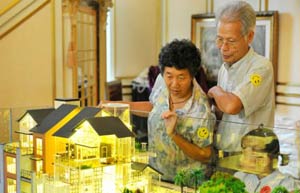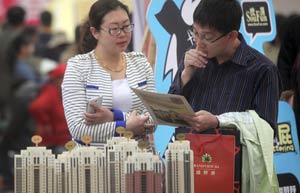BEIJING - China's languid property sector, which has seen signs of recovery after several cities lifted purchase restrictions, is likely to further stabilize in the fourth quarter this year under eased credit, analysts have forecast.
Various forms of policy easing were seen in 37 of 46 cities that previously imposed market control measures ranging from purchase limits on second homes to higher minimum down-payments, said a report in the China Securities Journal, citing data from real estate agency Centaline, on Wednesday.
For first-tier cities, where authorities refuse to loosen their grip on purchasing rules, the easing may come in more subtle way. Shanghai Securities News reported Wednesday that Beijing's municipal housing authority is mulling a plan to adjust the standard for "general housing."
 |
 |
It seemed like encouraging news for the troubled property sector, which saw a streak of declines in sales over the past few months. New home prices in 55 of an official sample of 70 major cities dropped month on month in June, compared with 35 in May.
The market fluctuation comes alongside China's efforts to restructure and de-leverage its economy. The country's growth dropped to 7.4 percent in the first half of 2014 from 7.7-percent last year.
Meanwhile, the removal or easing of purchase limits, mostly in second- and third-tier cities where inventories are high, seemed to have taken effect. Data from Centaline showed the total floor space of newly constructed homes sold in 40 major cities in July climbed 7 percent month on month.
However, in first-tier cities where the market can be stirred by slight policy changes, more sophistication is needed to quell the tug-of-war between home buyers, developers and government, according to analysts.
Zhang Dawei, chief analyst from Centaline, noted a 5 to 10-percent markdown in home prices for some projects in Beijing. A select few have gone down by almost 20 percent, but he said the market outlook for the property sector still fluctuates between warm and chilly.
Lu Qilin, director of the research division for Shanghai-based Dooioo Real Estate, said the lifted purchase restrictions in smaller cities helped increase developers' cash flows and may put a brake on their willingness to introduce discounts in first-tier metropolises.
But analysts said as more commercial banks become lenient in issuing loans to home buyers amid overall eased credit supply, the property sector will recover further toward the end of the year.
Zhang Hongwei, director of real estate consulting firm Tospur, predicted credit supply will see targeted easing in the last quarter and will better support first home purchases, citing 14.7-percent year-on-year growth of M2, a broad measure of money supply, in June.
He forecast a steady price increase for second-tier cities like Hefei, Nanjing, Nanchang and Suzhou where the housing supply generally meets or comes short of demand.
